
Updated 2024 Approved Ancient Aria Top-Tier Music Picks for Wedding Video Production

“Ancient Aria: Top-Tier Music Picks for Wedding Video Production”
When choosing classic background music for wedding videos, you need to be extra careful. You cannot choose regular songs to capture the emotions of the best moments of your life. The music should connect with your emotions, so whenever you watch the movie, you remember the time you got married. In this post, we will share some mind-blowing classical background music that will make your wedding special and memorable.
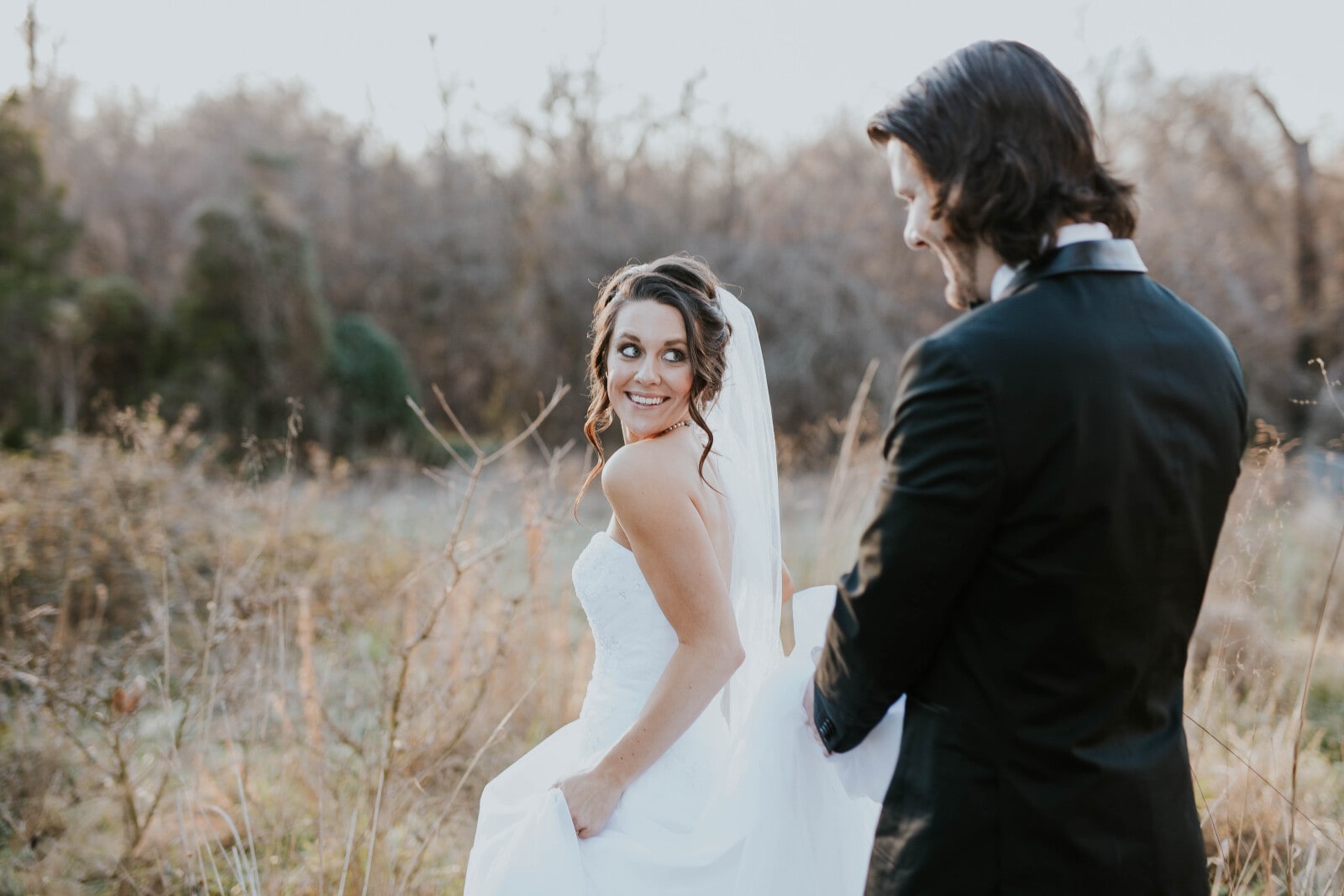
10 Best Classical Background Music for Wedding Videos in 2024
A wedding video contains a plethora of scenes and memories. If your video includes rehearsal dinner, photography session, and dinner, you should opt for music that blends with each set. Tears and smiles, every moment calls for a different classical background song. Here are some royalty-free classical background pieces that you can use for your wedding videos this year:
1. Rhythmic Piano
This is an incredible piano piece perfect for wedding videos. It contains beautiful piano with a calm and soothing melody. This classical background will evoke feelings and memories when you will watch your wedding videos in the future. You can use this music for highlights of the wedding in the introduction because it contains emotions for every wedding setting.
2. The Wedding Moment
Over the sky of hope is another masterpiece for wedding ceremony videos. It is bright and joyful classical background music with orchestral strings and bold grand piano. You can choose this song for the first dance at the wedding. The music will incredibly portray your love and emotion for your partner.
3. Happy Wedding Upbeat Background Sound
This classical background music has a clear message of love and affection. You can use this music for multiple scenes at the wedding. The funny elements in this masterpiece will perfectly blend with funny scenes at the wedding. Furthermore, you can use this music for scenes with the audience, enjoying the ceremony.
4. Piano and Strings Wedding
The emotional and mellow introduction of this classical background will beautifully blend with your wedding videos. This heartfelt and cinematic track has a bit of ambient touch that gives a joyful and loving feel. You can add this song when you and your life partners will walk down the aisle.
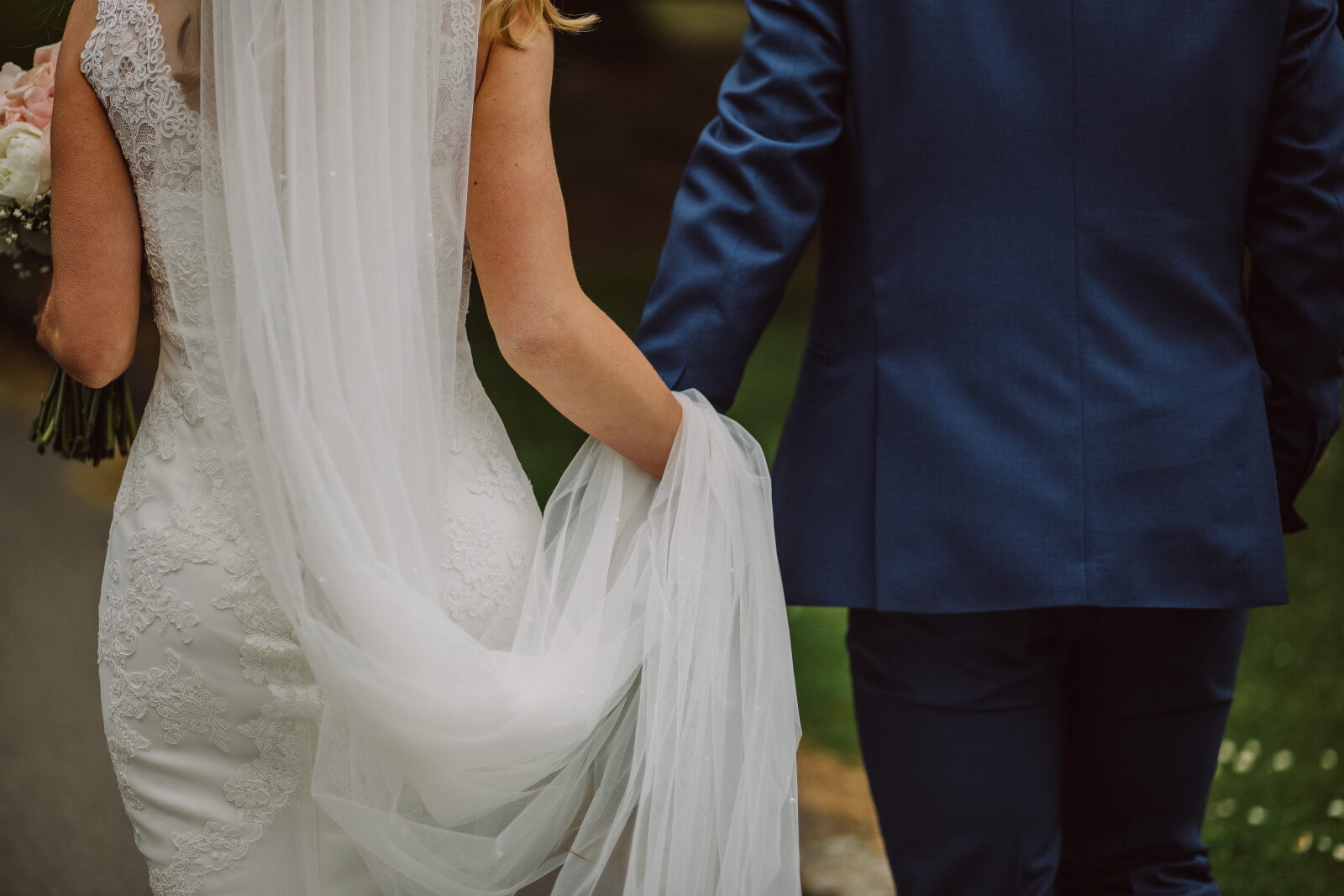
5. Old Time
Old Time is slow classical background music, which is perfectly designed for wedding ceremonies. It has a simple yet powerful composition that will make your loved ones cry with happiness.
6. Wedding Love Piano
You will enjoy this lovely background music aligned with your first dance as a wedded couple. This composition sounds breathtaking on the grand piano. This classical melody in your video is enough to make your family and friends cry tears of joy.
7. Piano Music Orchestra
You can add this classical background music in the ending to create touching moments filled with powerful feelings. When your wedding video will end with this music, your audience had to take some time to recover from their emotions.
8. The Season of Love
In this short romantic classical background music, the composer played different octaves to create romantic vibes. Thus, it will sound splendid with your wedding video. Although it is a short music piece, there are many versions . You can layer the versions one after another to play with the audience’s joy and feeling.

9. Mid Night Self Expression
This is a unique masterpiece that includes acoustic guitar, accordion, and other unique musical instruments. The song includes a folk melody that will leave your audience in joy and happiness. You can play this song in various wedding settings to add emotions to your video.
10. Wonderful Wedding
This lovely wedding classical background includes nice rhythms, melodies, and ballads that make it perfect for a summary. If you have a segment in your video with highlights of multiple settings, you can use this music for that part.
How to Create a Romantic Wedding Invitation?
If you design your wedding invitation, you can decide the element according to your preferences. Elements such as video clips, pictures, and music add emotions to your video. If even a single element is not perfect, your wedding invitation won’t look as good as you want. Therefore, you should take control and create a romantic wedding invitation on a user-friendly video editor, Wondershare Filmora . Here is the step-by-step guide to creating a romantic wedding invitation with classical background music:
For Win 7 or later (64-bit)
For macOS 10.12 or later
Step 1: Open Wondershare Filmora, create a new project and import your files to get started.

Step 2: Now drag video clips and photos on the timeline and arrange the sequences and clips.
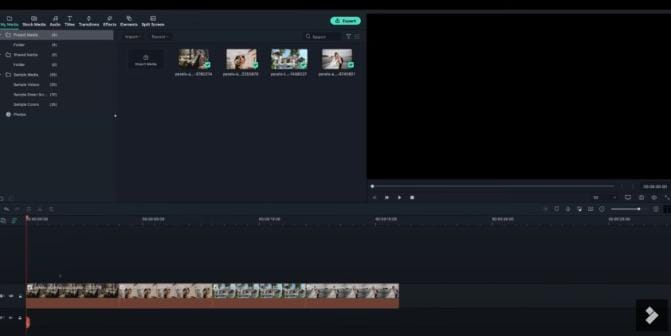
Step 3: If the photo size doesn’t match the video size, you can change the ratio in the crop section. This changes the aspect ratio of the video.
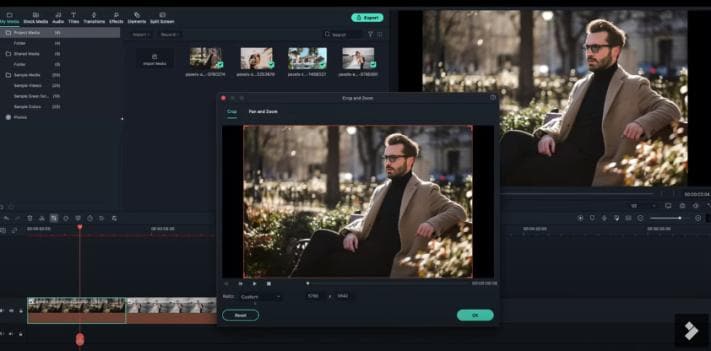
Step 4: Set the ratio for all videos and images.
Step 5: Now open the titles tab and search weddings. You can choose from a myriad of wedding-style templates on Filmora.
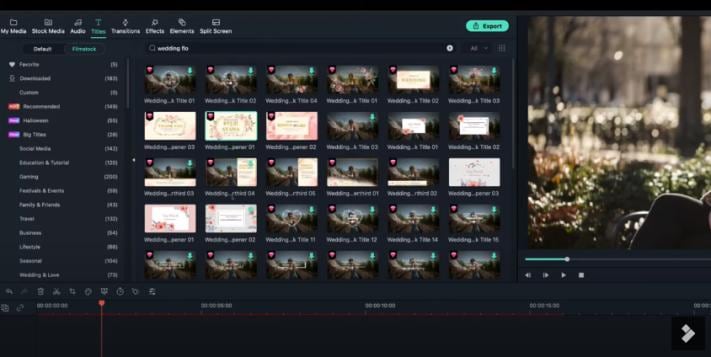
Step 6: Once you choose the title, you can drag it on your timeline. The title tag will look incredible at the start and the ending. Thus, you have to choose two title tags.
Step 7: Double-click on the first title and click on the advanced buttons. This feature enables you to customize your tags add change color, text, and fonts.
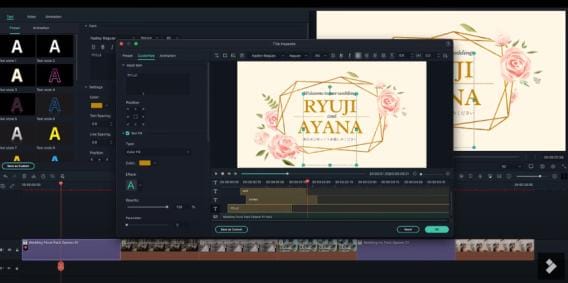
Step 8: Make the same changes for the second title tag as well.
Step 9: After selecting the right title tag, you can include elements on your images or video clips.
Step 10: Go to the Effects tab and search wedding floral. A wide range of options will appear in the media section. Choose the tags that you like the most and drag them on a new track.
Step 11: Now it’s time to add the titles to introduce the bride and groom. Furthermore, this section will also include the wedding location and other details for the wedding.
Step 12: Move to the transition section add transition presets and search for the effects you like for your video. Choose the transition and drag between the clips.
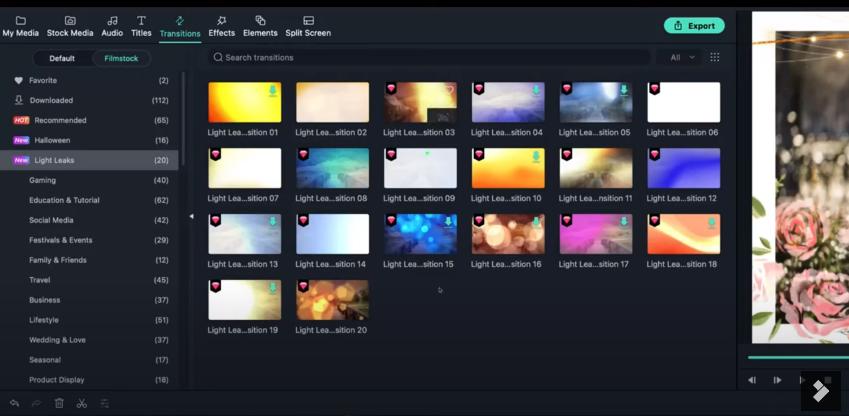
Step 13: Your wedding invitation is almost ready. All you need to add is classical background music. For that, you can search the music from the audio tab or choose from the above-mentioned options. Also, you can import music from your computer to use in the video
Step 14: You can export the video from the tool and send your friends and family on Whastapp or post it on Facebook.
Closing Words
The above-mentioned classical background music will enhance the sentiments in your wedding videos. Music helps the audience to connect with your emotions. Therefore, you should choose the classical background music carefully according to each segment. It would be best to list the video sections on a piece of paper and write the song’s name in front of it. That way, you will get a complete overview of your video’s layout.
You can use Filmora video editor to create your wedding videos and invitation. Filmora is a user-friendly video editing tool with advanced features. The effects and templates simplify the editing task and you can create emotional wedding videos in minutes. Filmora video editor includes features such as an audio mixer, advanced text editing, audio equalizer, and video stabilizer.
For Win 7 or later (64-bit)
For macOS 10.12 or later
For Win 7 or later (64-bit)
For macOS 10.12 or later
Step 1: Open Wondershare Filmora, create a new project and import your files to get started.

Step 2: Now drag video clips and photos on the timeline and arrange the sequences and clips.

Step 3: If the photo size doesn’t match the video size, you can change the ratio in the crop section. This changes the aspect ratio of the video.

Step 4: Set the ratio for all videos and images.
Step 5: Now open the titles tab and search weddings. You can choose from a myriad of wedding-style templates on Filmora.

Step 6: Once you choose the title, you can drag it on your timeline. The title tag will look incredible at the start and the ending. Thus, you have to choose two title tags.
Step 7: Double-click on the first title and click on the advanced buttons. This feature enables you to customize your tags add change color, text, and fonts.

Step 8: Make the same changes for the second title tag as well.
Step 9: After selecting the right title tag, you can include elements on your images or video clips.
Step 10: Go to the Effects tab and search wedding floral. A wide range of options will appear in the media section. Choose the tags that you like the most and drag them on a new track.
Step 11: Now it’s time to add the titles to introduce the bride and groom. Furthermore, this section will also include the wedding location and other details for the wedding.
Step 12: Move to the transition section add transition presets and search for the effects you like for your video. Choose the transition and drag between the clips.

Step 13: Your wedding invitation is almost ready. All you need to add is classical background music. For that, you can search the music from the audio tab or choose from the above-mentioned options. Also, you can import music from your computer to use in the video
Step 14: You can export the video from the tool and send your friends and family on Whastapp or post it on Facebook.
Closing Words
The above-mentioned classical background music will enhance the sentiments in your wedding videos. Music helps the audience to connect with your emotions. Therefore, you should choose the classical background music carefully according to each segment. It would be best to list the video sections on a piece of paper and write the song’s name in front of it. That way, you will get a complete overview of your video’s layout.
You can use Filmora video editor to create your wedding videos and invitation. Filmora is a user-friendly video editing tool with advanced features. The effects and templates simplify the editing task and you can create emotional wedding videos in minutes. Filmora video editor includes features such as an audio mixer, advanced text editing, audio equalizer, and video stabilizer.
For Win 7 or later (64-bit)
For macOS 10.12 or later
For Win 7 or later (64-bit)
For macOS 10.12 or later
Step 1: Open Wondershare Filmora, create a new project and import your files to get started.

Step 2: Now drag video clips and photos on the timeline and arrange the sequences and clips.

Step 3: If the photo size doesn’t match the video size, you can change the ratio in the crop section. This changes the aspect ratio of the video.

Step 4: Set the ratio for all videos and images.
Step 5: Now open the titles tab and search weddings. You can choose from a myriad of wedding-style templates on Filmora.

Step 6: Once you choose the title, you can drag it on your timeline. The title tag will look incredible at the start and the ending. Thus, you have to choose two title tags.
Step 7: Double-click on the first title and click on the advanced buttons. This feature enables you to customize your tags add change color, text, and fonts.

Step 8: Make the same changes for the second title tag as well.
Step 9: After selecting the right title tag, you can include elements on your images or video clips.
Step 10: Go to the Effects tab and search wedding floral. A wide range of options will appear in the media section. Choose the tags that you like the most and drag them on a new track.
Step 11: Now it’s time to add the titles to introduce the bride and groom. Furthermore, this section will also include the wedding location and other details for the wedding.
Step 12: Move to the transition section add transition presets and search for the effects you like for your video. Choose the transition and drag between the clips.

Step 13: Your wedding invitation is almost ready. All you need to add is classical background music. For that, you can search the music from the audio tab or choose from the above-mentioned options. Also, you can import music from your computer to use in the video
Step 14: You can export the video from the tool and send your friends and family on Whastapp or post it on Facebook.
Closing Words
The above-mentioned classical background music will enhance the sentiments in your wedding videos. Music helps the audience to connect with your emotions. Therefore, you should choose the classical background music carefully according to each segment. It would be best to list the video sections on a piece of paper and write the song’s name in front of it. That way, you will get a complete overview of your video’s layout.
You can use Filmora video editor to create your wedding videos and invitation. Filmora is a user-friendly video editing tool with advanced features. The effects and templates simplify the editing task and you can create emotional wedding videos in minutes. Filmora video editor includes features such as an audio mixer, advanced text editing, audio equalizer, and video stabilizer.
For Win 7 or later (64-bit)
For macOS 10.12 or later
For Win 7 or later (64-bit)
For macOS 10.12 or later
Step 1: Open Wondershare Filmora, create a new project and import your files to get started.

Step 2: Now drag video clips and photos on the timeline and arrange the sequences and clips.

Step 3: If the photo size doesn’t match the video size, you can change the ratio in the crop section. This changes the aspect ratio of the video.

Step 4: Set the ratio for all videos and images.
Step 5: Now open the titles tab and search weddings. You can choose from a myriad of wedding-style templates on Filmora.

Step 6: Once you choose the title, you can drag it on your timeline. The title tag will look incredible at the start and the ending. Thus, you have to choose two title tags.
Step 7: Double-click on the first title and click on the advanced buttons. This feature enables you to customize your tags add change color, text, and fonts.

Step 8: Make the same changes for the second title tag as well.
Step 9: After selecting the right title tag, you can include elements on your images or video clips.
Step 10: Go to the Effects tab and search wedding floral. A wide range of options will appear in the media section. Choose the tags that you like the most and drag them on a new track.
Step 11: Now it’s time to add the titles to introduce the bride and groom. Furthermore, this section will also include the wedding location and other details for the wedding.
Step 12: Move to the transition section add transition presets and search for the effects you like for your video. Choose the transition and drag between the clips.

Step 13: Your wedding invitation is almost ready. All you need to add is classical background music. For that, you can search the music from the audio tab or choose from the above-mentioned options. Also, you can import music from your computer to use in the video
Step 14: You can export the video from the tool and send your friends and family on Whastapp or post it on Facebook.
Closing Words
The above-mentioned classical background music will enhance the sentiments in your wedding videos. Music helps the audience to connect with your emotions. Therefore, you should choose the classical background music carefully according to each segment. It would be best to list the video sections on a piece of paper and write the song’s name in front of it. That way, you will get a complete overview of your video’s layout.
You can use Filmora video editor to create your wedding videos and invitation. Filmora is a user-friendly video editing tool with advanced features. The effects and templates simplify the editing task and you can create emotional wedding videos in minutes. Filmora video editor includes features such as an audio mixer, advanced text editing, audio equalizer, and video stabilizer.
For Win 7 or later (64-bit)
For macOS 10.12 or later
Innovations in Digital Audio Recording: Utilizing Audacity’s Features (Updated )
In modern times, it has become a common practice to record your audio files. This is usually beneficial for many purposes. Be it for business meetings, podcasts, or just an informative lecture you have taken down. You will always need to record computer audio from time to time in the year 2022.
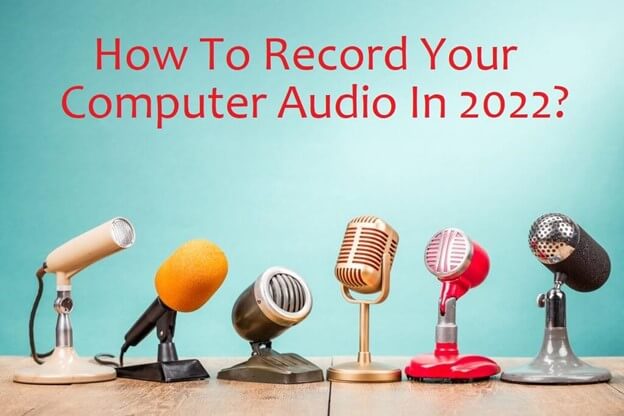
Over the past decade or so, computer users have recorded their audio and converted it into a digital format with relative ease. However, users look to record computer audio at even the highest quality levels. And while the technology needed to achieve this is readily available in both software and hardware forms, it can be somewhat complex.
If you want to record any sound or audio on your computer, this article is meant for you. Whether you are looking to do a voice-over on a video or just want to record some random audio notes, you can easily make it happen. This article will guide you to record your computer audio using a PC easily. We will share different methods using which you can record computer audio.
This article is not directed at potential audio recorders but rather at those looking to improve the audio quality of their recordings. Users will already have their microphone and recording equipment, yet they may find this article useful.
Recording Voice On Windows
If you are using a pc or desktop, then keep in mind that most operating systems have their own default recording software that comes pre-installed. Most people don’t know about them, and they rush for 3rd party applications for sound recording purposes. It doesn’t matter if you use Windows 7, 8, 10, or 11. Windows operating system also has its recorder app. It will be available on your system, and all you need to do is find it and use it. If you are unsure how to do that, then follow the steps given below.
- Go to the search options of your windows and type “Voice Recorder” in it.
- Click on the search button, and the voice recorder app will appear in the top searches.
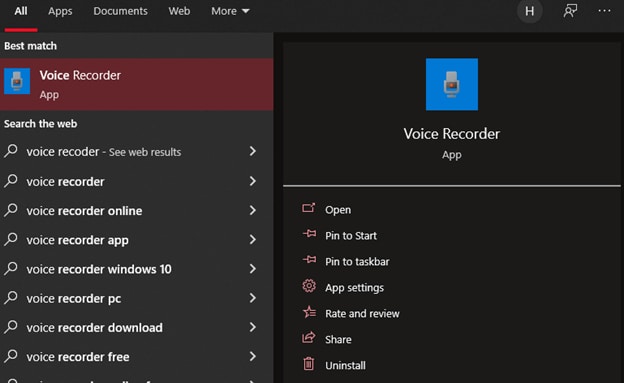
- Just open the app, and a recording button will appear on the screen. All you need to do is, click on the recording icon, and it will start recording your audio from your microphone, and when you are done recording, you click on the stop recording button, and it will automatically be saved on your computer.
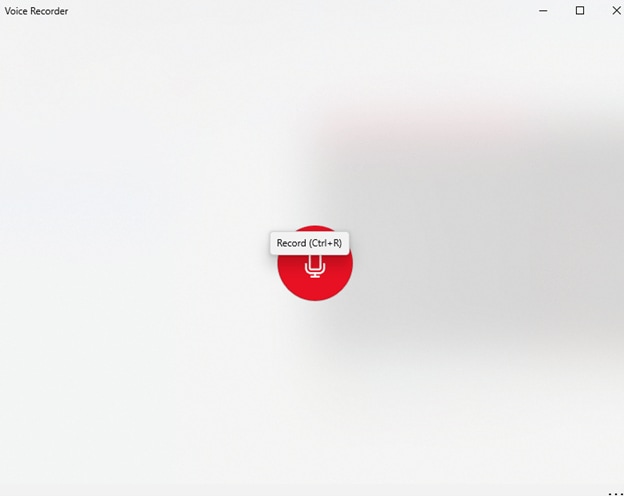
Recording Voice On Mac
If you are using Mac operating system, then it also has its recording app. Just follow the steps given below:
Recordings can be created using the built-in microphone, an external microphone, or a headset with a supported microphone. If you’re signed in with the same Apple ID on your iPad, iPhone, or Mac, you can listen to your Voice Memos recordings on any of those devices.
- Click on the Record button (or use the Touch Bar) inside the Voice Memos app on your Mac.
- By clicking the Pause button, you can pause the video. You can resume the video by clicking Resume.
- At the bottom of the page, click Done when you are finished.
Record Voice Using Audacity
Although you can record the computer audio using built-in tools, many 3rd party tools like Audacity provide you with more features and better quality than the built-in tools. To use Audacity for recording your pc audio, follow the steps given below.
- First of all, you need to download the audacity software to your pc. Different versions of Audacity are available for different operating systems. So, you can try searching “audacity windows 7”, “audacity windows 8”, “audacity windows 10”, or “audacity mac” depending upon the operating system you are using.
- Once it is installed, run the software, and its interface will appear on your screen.
- Now you’ll need to customize the drop-down boxes above the timeline. The farthest thing on the left should be ‘Windows WASAPI’. From the next choice to the right, choose ‘Speakers (Realtek(R) Audio) (loopback)’.
- It’s important to set the Recording Channel to 2 (Stereo). Otherwise, an error message will likely appear. Verify that the output device is set to the appropriate speakers
- Once you have finished, click the red circle on top of your screen, and Audacity will record the audio that comes out of your speakers. If no audio is detected, the recording will be automatically paused. You can also stop by hitting the grey stop button at the top at any time
- Audio editing tools like Audacity allow you to edit your recording after recording it and export it in several formats based on what you recorded.
Final Verdict
That’s how it works. Here are two easy ways to record the audio coming from your PC. Record internal audio (such as what comes out of your microphone) with Windows/Mac 10’s built-in ‘Voice Recorder’ app or Audacity. These applications are both extremely simple to use. To get the best audio quality, we recommend trying our Filmora Audio tools. Although Audacity does the job pretty well with filmora audio tools and voice packs, you can add many voice effects and edit your audio professionally. Give it a try as it is free to use.
For Win 7 or later (64-bit)
For macOS 10.12 or later
Over the past decade or so, computer users have recorded their audio and converted it into a digital format with relative ease. However, users look to record computer audio at even the highest quality levels. And while the technology needed to achieve this is readily available in both software and hardware forms, it can be somewhat complex.
If you want to record any sound or audio on your computer, this article is meant for you. Whether you are looking to do a voice-over on a video or just want to record some random audio notes, you can easily make it happen. This article will guide you to record your computer audio using a PC easily. We will share different methods using which you can record computer audio.
This article is not directed at potential audio recorders but rather at those looking to improve the audio quality of their recordings. Users will already have their microphone and recording equipment, yet they may find this article useful.
Recording Voice On Windows
If you are using a pc or desktop, then keep in mind that most operating systems have their own default recording software that comes pre-installed. Most people don’t know about them, and they rush for 3rd party applications for sound recording purposes. It doesn’t matter if you use Windows 7, 8, 10, or 11. Windows operating system also has its recorder app. It will be available on your system, and all you need to do is find it and use it. If you are unsure how to do that, then follow the steps given below.
- Go to the search options of your windows and type “Voice Recorder” in it.
- Click on the search button, and the voice recorder app will appear in the top searches.

- Just open the app, and a recording button will appear on the screen. All you need to do is, click on the recording icon, and it will start recording your audio from your microphone, and when you are done recording, you click on the stop recording button, and it will automatically be saved on your computer.

Recording Voice On Mac
If you are using Mac operating system, then it also has its recording app. Just follow the steps given below:
Recordings can be created using the built-in microphone, an external microphone, or a headset with a supported microphone. If you’re signed in with the same Apple ID on your iPad, iPhone, or Mac, you can listen to your Voice Memos recordings on any of those devices.
- Click on the Record button (or use the Touch Bar) inside the Voice Memos app on your Mac.
- By clicking the Pause button, you can pause the video. You can resume the video by clicking Resume.
- At the bottom of the page, click Done when you are finished.
Record Voice Using Audacity
Although you can record the computer audio using built-in tools, many 3rd party tools like Audacity provide you with more features and better quality than the built-in tools. To use Audacity for recording your pc audio, follow the steps given below.
- First of all, you need to download the audacity software to your pc. Different versions of Audacity are available for different operating systems. So, you can try searching “audacity windows 7”, “audacity windows 8”, “audacity windows 10”, or “audacity mac” depending upon the operating system you are using.
- Once it is installed, run the software, and its interface will appear on your screen.
- Now you’ll need to customize the drop-down boxes above the timeline. The farthest thing on the left should be ‘Windows WASAPI’. From the next choice to the right, choose ‘Speakers (Realtek(R) Audio) (loopback)’.
- It’s important to set the Recording Channel to 2 (Stereo). Otherwise, an error message will likely appear. Verify that the output device is set to the appropriate speakers
- Once you have finished, click the red circle on top of your screen, and Audacity will record the audio that comes out of your speakers. If no audio is detected, the recording will be automatically paused. You can also stop by hitting the grey stop button at the top at any time
- Audio editing tools like Audacity allow you to edit your recording after recording it and export it in several formats based on what you recorded.
Final Verdict
That’s how it works. Here are two easy ways to record the audio coming from your PC. Record internal audio (such as what comes out of your microphone) with Windows/Mac 10’s built-in ‘Voice Recorder’ app or Audacity. These applications are both extremely simple to use. To get the best audio quality, we recommend trying our Filmora Audio tools. Although Audacity does the job pretty well with filmora audio tools and voice packs, you can add many voice effects and edit your audio professionally. Give it a try as it is free to use.
For Win 7 or later (64-bit)
For macOS 10.12 or later
Over the past decade or so, computer users have recorded their audio and converted it into a digital format with relative ease. However, users look to record computer audio at even the highest quality levels. And while the technology needed to achieve this is readily available in both software and hardware forms, it can be somewhat complex.
If you want to record any sound or audio on your computer, this article is meant for you. Whether you are looking to do a voice-over on a video or just want to record some random audio notes, you can easily make it happen. This article will guide you to record your computer audio using a PC easily. We will share different methods using which you can record computer audio.
This article is not directed at potential audio recorders but rather at those looking to improve the audio quality of their recordings. Users will already have their microphone and recording equipment, yet they may find this article useful.
Recording Voice On Windows
If you are using a pc or desktop, then keep in mind that most operating systems have their own default recording software that comes pre-installed. Most people don’t know about them, and they rush for 3rd party applications for sound recording purposes. It doesn’t matter if you use Windows 7, 8, 10, or 11. Windows operating system also has its recorder app. It will be available on your system, and all you need to do is find it and use it. If you are unsure how to do that, then follow the steps given below.
- Go to the search options of your windows and type “Voice Recorder” in it.
- Click on the search button, and the voice recorder app will appear in the top searches.

- Just open the app, and a recording button will appear on the screen. All you need to do is, click on the recording icon, and it will start recording your audio from your microphone, and when you are done recording, you click on the stop recording button, and it will automatically be saved on your computer.

Recording Voice On Mac
If you are using Mac operating system, then it also has its recording app. Just follow the steps given below:
Recordings can be created using the built-in microphone, an external microphone, or a headset with a supported microphone. If you’re signed in with the same Apple ID on your iPad, iPhone, or Mac, you can listen to your Voice Memos recordings on any of those devices.
- Click on the Record button (or use the Touch Bar) inside the Voice Memos app on your Mac.
- By clicking the Pause button, you can pause the video. You can resume the video by clicking Resume.
- At the bottom of the page, click Done when you are finished.
Record Voice Using Audacity
Although you can record the computer audio using built-in tools, many 3rd party tools like Audacity provide you with more features and better quality than the built-in tools. To use Audacity for recording your pc audio, follow the steps given below.
- First of all, you need to download the audacity software to your pc. Different versions of Audacity are available for different operating systems. So, you can try searching “audacity windows 7”, “audacity windows 8”, “audacity windows 10”, or “audacity mac” depending upon the operating system you are using.
- Once it is installed, run the software, and its interface will appear on your screen.
- Now you’ll need to customize the drop-down boxes above the timeline. The farthest thing on the left should be ‘Windows WASAPI’. From the next choice to the right, choose ‘Speakers (Realtek(R) Audio) (loopback)’.
- It’s important to set the Recording Channel to 2 (Stereo). Otherwise, an error message will likely appear. Verify that the output device is set to the appropriate speakers
- Once you have finished, click the red circle on top of your screen, and Audacity will record the audio that comes out of your speakers. If no audio is detected, the recording will be automatically paused. You can also stop by hitting the grey stop button at the top at any time
- Audio editing tools like Audacity allow you to edit your recording after recording it and export it in several formats based on what you recorded.
Final Verdict
That’s how it works. Here are two easy ways to record the audio coming from your PC. Record internal audio (such as what comes out of your microphone) with Windows/Mac 10’s built-in ‘Voice Recorder’ app or Audacity. These applications are both extremely simple to use. To get the best audio quality, we recommend trying our Filmora Audio tools. Although Audacity does the job pretty well with filmora audio tools and voice packs, you can add many voice effects and edit your audio professionally. Give it a try as it is free to use.
For Win 7 or later (64-bit)
For macOS 10.12 or later
Over the past decade or so, computer users have recorded their audio and converted it into a digital format with relative ease. However, users look to record computer audio at even the highest quality levels. And while the technology needed to achieve this is readily available in both software and hardware forms, it can be somewhat complex.
If you want to record any sound or audio on your computer, this article is meant for you. Whether you are looking to do a voice-over on a video or just want to record some random audio notes, you can easily make it happen. This article will guide you to record your computer audio using a PC easily. We will share different methods using which you can record computer audio.
This article is not directed at potential audio recorders but rather at those looking to improve the audio quality of their recordings. Users will already have their microphone and recording equipment, yet they may find this article useful.
Recording Voice On Windows
If you are using a pc or desktop, then keep in mind that most operating systems have their own default recording software that comes pre-installed. Most people don’t know about them, and they rush for 3rd party applications for sound recording purposes. It doesn’t matter if you use Windows 7, 8, 10, or 11. Windows operating system also has its recorder app. It will be available on your system, and all you need to do is find it and use it. If you are unsure how to do that, then follow the steps given below.
- Go to the search options of your windows and type “Voice Recorder” in it.
- Click on the search button, and the voice recorder app will appear in the top searches.

- Just open the app, and a recording button will appear on the screen. All you need to do is, click on the recording icon, and it will start recording your audio from your microphone, and when you are done recording, you click on the stop recording button, and it will automatically be saved on your computer.

Recording Voice On Mac
If you are using Mac operating system, then it also has its recording app. Just follow the steps given below:
Recordings can be created using the built-in microphone, an external microphone, or a headset with a supported microphone. If you’re signed in with the same Apple ID on your iPad, iPhone, or Mac, you can listen to your Voice Memos recordings on any of those devices.
- Click on the Record button (or use the Touch Bar) inside the Voice Memos app on your Mac.
- By clicking the Pause button, you can pause the video. You can resume the video by clicking Resume.
- At the bottom of the page, click Done when you are finished.
Record Voice Using Audacity
Although you can record the computer audio using built-in tools, many 3rd party tools like Audacity provide you with more features and better quality than the built-in tools. To use Audacity for recording your pc audio, follow the steps given below.
- First of all, you need to download the audacity software to your pc. Different versions of Audacity are available for different operating systems. So, you can try searching “audacity windows 7”, “audacity windows 8”, “audacity windows 10”, or “audacity mac” depending upon the operating system you are using.
- Once it is installed, run the software, and its interface will appear on your screen.
- Now you’ll need to customize the drop-down boxes above the timeline. The farthest thing on the left should be ‘Windows WASAPI’. From the next choice to the right, choose ‘Speakers (Realtek(R) Audio) (loopback)’.
- It’s important to set the Recording Channel to 2 (Stereo). Otherwise, an error message will likely appear. Verify that the output device is set to the appropriate speakers
- Once you have finished, click the red circle on top of your screen, and Audacity will record the audio that comes out of your speakers. If no audio is detected, the recording will be automatically paused. You can also stop by hitting the grey stop button at the top at any time
- Audio editing tools like Audacity allow you to edit your recording after recording it and export it in several formats based on what you recorded.
Final Verdict
That’s how it works. Here are two easy ways to record the audio coming from your PC. Record internal audio (such as what comes out of your microphone) with Windows/Mac 10’s built-in ‘Voice Recorder’ app or Audacity. These applications are both extremely simple to use. To get the best audio quality, we recommend trying our Filmora Audio tools. Although Audacity does the job pretty well with filmora audio tools and voice packs, you can add many voice effects and edit your audio professionally. Give it a try as it is free to use.
For Win 7 or later (64-bit)
For macOS 10.12 or later
Also read:
- [New] Master the Art of Canvas with These Top 10 Secrets for 2024
- [Updated] Rapid Reference Green Screen Basics
- Airdrop Not Working, How to Fix It on iPhone, iPad, & Mac for 2024
- Best Platforms for Acquiring Lofi Tunes Downloads for 2024
- Expert Tips: Resolve Borderlands 3 Stuttering & Stop Game Lag
- Guilty Gear Strive Trouble? Here's How to Stop PC Game Crashes in 5 Easy Steps
- In 2024, Delete Gmail Account With/Without Password On Poco X6
- In 2024, Leading Music Editor Tools Ranked Windows & Mac Edition, Top 10
- In 2024, Unveiling the Process Precision Recording of Roblox Adventures on Apple Devices
- IPhone & iPad: Verifying Genuine AI Services
- New 2024 Approved Unlocking MP4 Ten Simplified Techniques for Auditory Access
- The Best Digital Audio Trimmer Tools of the Future for 2024
- Top 10 Complimentary Web-Based Sound Level Regulators
- Updated In 2024, Assessing Whether MAGIX Samplitude Truly Dominates Music Production Tools
- Updated Premier Top 10 Audio Manipulation Software for Windows and Mac Users
- Title: Updated 2024 Approved Ancient Aria Top-Tier Music Picks for Wedding Video Production
- Author: David
- Created at : 2024-10-07 16:26:29
- Updated at : 2024-10-11 21:43:18
- Link: https://sound-tweaking.techidaily.com/updated-2024-approved-ancient-aria-top-tier-music-picks-for-wedding-video-production/
- License: This work is licensed under CC BY-NC-SA 4.0.